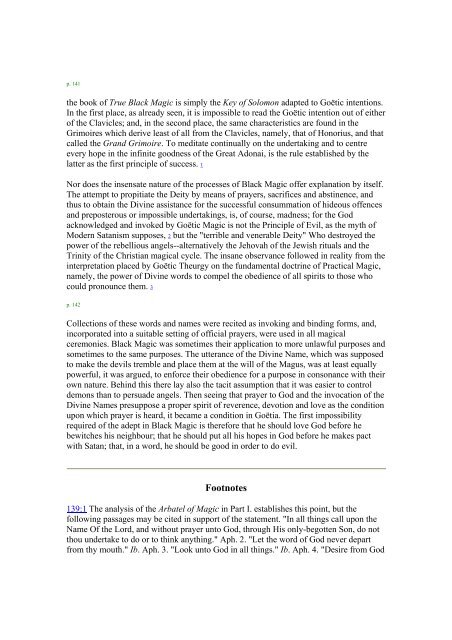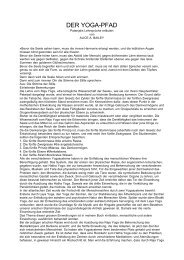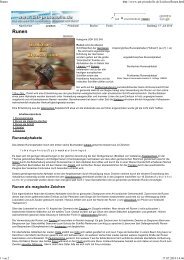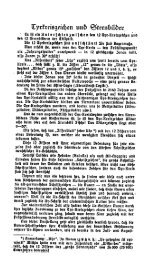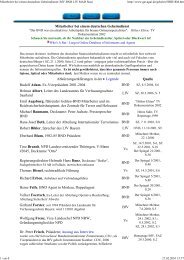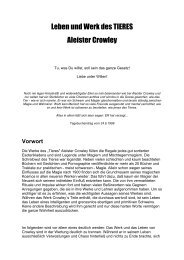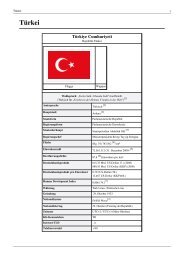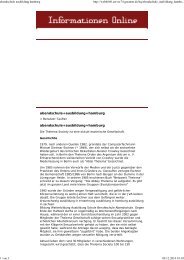The Book of ceremonial Magic
The Book of ceremonial Magic
The Book of ceremonial Magic
Create successful ePaper yourself
Turn your PDF publications into a flip-book with our unique Google optimized e-Paper software.
p. 141<br />
the book <strong>of</strong> True Black <strong>Magic</strong> is simply the Key <strong>of</strong> Solomon adapted to Goëtic intentions.<br />
In the first place, as already seen, it is impossible to read the Goëtic intention out <strong>of</strong> either<br />
<strong>of</strong> the Clavicles; and, in the second place, the same characteristics are found in the<br />
Grimoires which derive least <strong>of</strong> all from the Clavicles, namely, that <strong>of</strong> Honorius, and that<br />
called the Grand Grimoire. To meditate continually on the undertaking and to centre<br />
every hope in the infinite goodness <strong>of</strong> the Great Adonai, is the rule established by the<br />
latter as the first principle <strong>of</strong> success. 1<br />
Nor does the insensate nature <strong>of</strong> the processes <strong>of</strong> Black <strong>Magic</strong> <strong>of</strong>fer explanation by itself.<br />
<strong>The</strong> attempt to propitiate the Deity by means <strong>of</strong> prayers, sacrifices and abstinence, and<br />
thus to obtain the Divine assistance for the successful consummation <strong>of</strong> hideous <strong>of</strong>fences<br />
and preposterous or impossible undertakings, is, <strong>of</strong> course, madness; for the God<br />
acknowledged and invoked by Goëtic <strong>Magic</strong> is not the Principle <strong>of</strong> Evil, as the myth <strong>of</strong><br />
Modern Satanism supposes, 2 but the "terrible and venerable Deity" Who destroyed the<br />
power <strong>of</strong> the rebellious angels--alternatively the Jehovah <strong>of</strong> the Jewish rituals and the<br />
Trinity <strong>of</strong> the Christian magical cycle. <strong>The</strong> insane observance followed in reality from the<br />
interpretation placed by Goëtic <strong>The</strong>urgy on the fundamental doctrine <strong>of</strong> Practical <strong>Magic</strong>,<br />
namely, the power <strong>of</strong> Divine words to compel the obedience <strong>of</strong> all spirits to those who<br />
could pronounce them. 3<br />
p. 142<br />
Collections <strong>of</strong> these words and names were recited as invoking and binding forms, and,<br />
incorporated into a suitable setting <strong>of</strong> <strong>of</strong>ficial prayers, were used in all magical<br />
ceremonies. Black <strong>Magic</strong> was sometimes their application to more unlawful purposes and<br />
sometimes to the same purposes. <strong>The</strong> utterance <strong>of</strong> the Divine Name, which was supposed<br />
to make the devils tremble and place them at the will <strong>of</strong> the Magus, was at least equally<br />
powerful, it was argued, to enforce their obedience for a purpose in consonance with their<br />
own nature. Behind this there lay also the tacit assumption that it was easier to control<br />
demons than to persuade angels. <strong>The</strong>n seeing that prayer to God and the invocation <strong>of</strong> the<br />
Divine Names presuppose a proper spirit <strong>of</strong> reverence, devotion and love as the condition<br />
upon which prayer is heard, it became a condition in Goëtia. <strong>The</strong> first impossibility<br />
required <strong>of</strong> the adept in Black <strong>Magic</strong> is therefore that he should love God before he<br />
bewitches his neighbour; that he should put all his hopes in God before he makes pact<br />
with Satan; that, in a word, he should be good in order to do evil.<br />
Footnotes<br />
139:1 <strong>The</strong> analysis <strong>of</strong> the Arbatel <strong>of</strong> <strong>Magic</strong> in Part I. establishes this point, but the<br />
following passages may be cited in support <strong>of</strong> the statement. "In all things call upon the<br />
Name Of the Lord, and without prayer unto God, through His only-begotten Son, do not<br />
thou undertake to do or to think anything." Aph. 2. "Let the word <strong>of</strong> God never depart<br />
from thy mouth." Ib. Aph. 3. "Look unto God in all things." Ib. Aph. 4. "Desire from God


